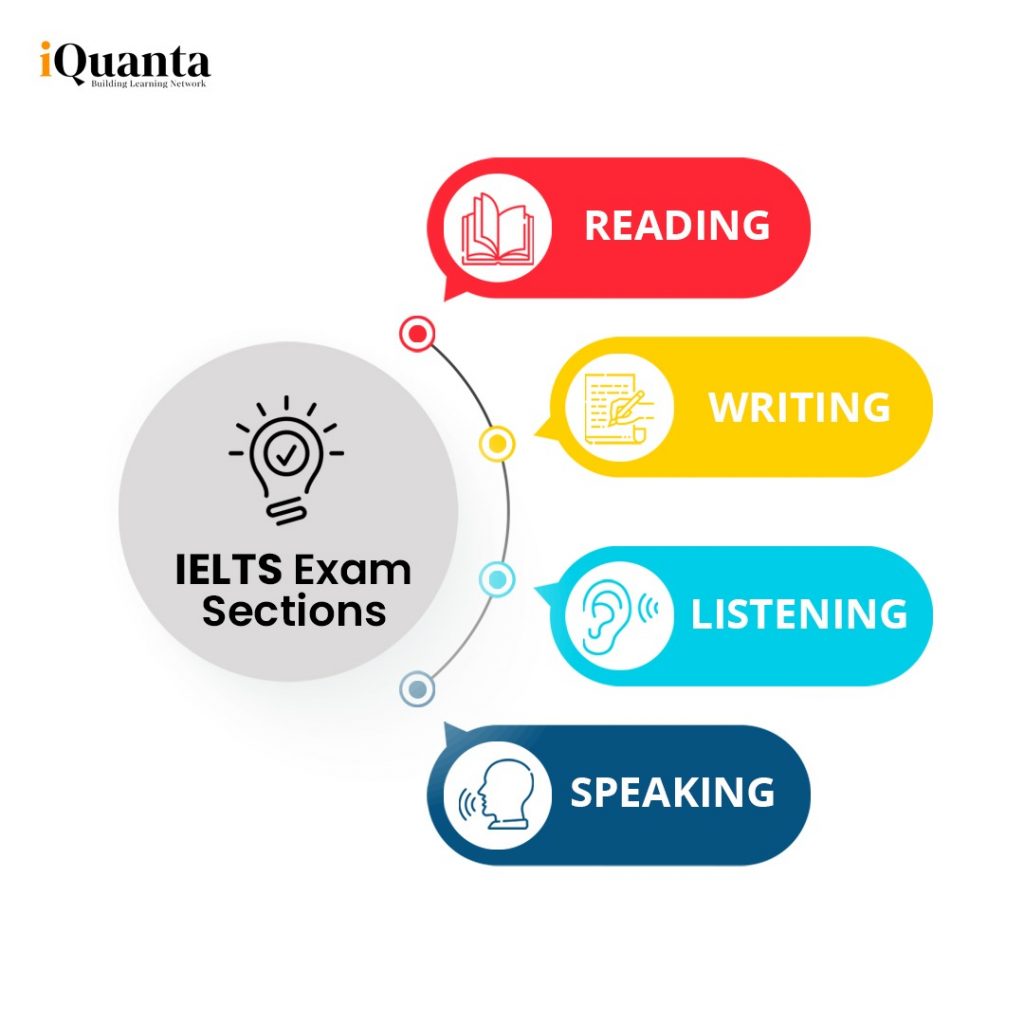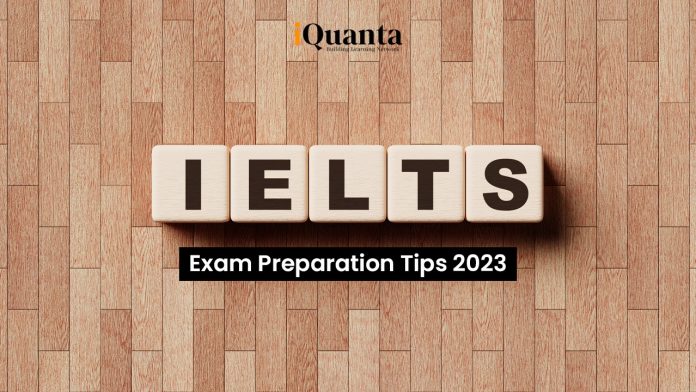Planning to attempt IELTS for academics? We share section-wise IELTS exam preparation tips for 2023.
The International English Language Testing System (IELTS) exam is one of the most important tests that a student has to take in order to enter an institute abroad. It serves as an assessment tool to measure an individual’s level of proficiency in the four main components of language fluency – reading, writing, listening, and speaking. With thousands of people seeking to pursue higher education or gain entry into various institutions outside their home country each year, mastering the IELTS Exam is a necessity. This blog post guides readers through understanding why IELTS is important and provides them with proven techniques for acing this challenging exam.
IELTS Exam – Proven Techniques to Ace It in Style
The International English Language Testing System (IELTS) exam is a universally accepted method of assessing language proficiency in the four sections – reading, writing, listening and speaking. It not only serves as an essential tool for those seeking entry into higher education or other institutions abroad, but is also increasingly becoming necessary for professional advancement in many countries. With more and more people taking up this test every year, it is important to know how to ace it with ease.
From learning about each component’s format to exploring tips from experts who have successfully passed the IELTS exam themselves, we have covered everything one needs to know when preparing for this crucial assessment. It offers useful advice ranging from self-studying techniques such as timed practice tests, utilizing online resources like video tutorials and mock exams etc., to simple yet effective strategies like focusing on accuracy rather than speed during preparation time.
All these methods are designed with one goal – helping individuals achieve their desired scores, so they can go ahead confidently towards achieving their dreams of studying or residing abroad!
Why the IELTS Exam is Important
The IELTS exam is a globally recognized language proficiency test that serves as an essential requirement for students and professionals seeking to pursue higher education or gain entry into institutions abroad. This exam assesses fluency in the four main components of language – reading, writing, listening and speaking, making it a critical examination for those aspiring to study or work internationally.
Moreover, this assessment also has increasing importance in many countries as employers use IELTS scores as part of their recruitment process. For example, some organizations require applicants to demonstrate their language proficiency by providing evidence of their IELTS score. Therefore, mastering the IELTS Exam is becoming more crucial than ever before in order to secure one’s future career prospects abroad. As such, passing this rigorous test with flying colours is necessary for individuals who want to achieve success across international borders!
Countries that Require IELTS Exam Score For Higher Studies
The following countries accept IELTS scores for admission to study abroad programs:
- United States of America
- United Kingdom
- Canada
- Australia
- Germany
- France
- Ireland
- Italy
- New Zealand
- Spain
- Switzerland
- Singapore
- Netherlands
In some countries, IELTS scores are accepted by only a few universities. If you apply for an MBA abroad study program, do check the university guidelines to see if an IELTS test score is required for the admission process.
IELTS Exam Preparation Tips 2023
Acing the IELTS exam requires dedication and hard work. To help individuals achieve their desired scores, there are a number of proven tips that can be used to increase one’s chance of success in this exam.
- Firstly, it is important to create an effective study plan by breaking down each component into manageable tasks and setting realistic goals for each section.
- Secondly, practising timed tests is essential as it will not only help build up speed but also give you a better sense of how long you have for each individual task on the day of the exam. Additionally, utilizing online resources such as video tutorials or mock exams can provide invaluable insights into strategies used by experts who have successfully passed IELTS themselves.
- Last but not least, focus on accuracy rather than speed during preparation time; studying with small details in mind will ensure that all topics are thoroughly covered and mistakes are avoided when taking the actual test.

Section-wise IELTS Exam Preparation Tips
It is essential to understand the format of each section to prepare accordingly.
IELTS Reading Exam Preparation Tips
The text in academic IELTS reading exam is challenging.
| Test Level | Difficult |
| Test Duration | 60 Minutes |
Format
- The reading test is divided into three sections, each with one long text.
- Excerpts for the text are taken from magazines, books or newspapers.
- Topics are generic.
- Excerpts can either be analytical and discursive or factual and descriptive.
- Texts may contain illustrations, graphs or diagrams.
- If jargons or technical terms are used, a glossary will be provided.
Practice Tips
- Develop reading habit to increase your reading speed. If you are a non-reader, start with reading the newspaper’s editorial section. Then read books and magazines of any genre as per your liking.
- Glance through the passage and questions first to get familiar.
- Read and re-read the passage thoroughly.
- Make notes of important words or information given in the passage.
- Write down the important names of people/places, dates and/or numbers mentioned in the passage. It can help to answer the questions later.
- Attempting IELTS on paper? Get into a habit of writing answers directly on the answer sheet. Do not waste time in marking the answers on the question paper. You will not get extra time, so use the time wisely.
- If you get stuck on any question. Leave it, move on to next question. Come back to it at the end.
IELTS Writing Exam Preparation Tips
The IELTS writing test consists of topics suitable for undergraduates and postgraduates.
| Test Level | Moderate |
| Test Duration | 60 Minutes |
Format
This test is divided into two tasks, Task 1 and Task 2.
| Topics Given | General Interest |
| Style of Response | Academic, Semi-formal or Neutral |
| Spellings Acceptable for Computer-based IELTS exam | British, Standard American, Australian |
- Task 1: In this task, you have to answer question based on the given diagrams, table, graph or chart. You have to summarize the information in your words or select and compare data. Furthermore, you could be asked to describe the stages of a process, an object or how a thing works.
Time Duration: 20 minutes
- Task 2: In this task, you have to write an essay in response to an argument, problem or point of view.
Time Duration: 40 minutes
Tip: Use your time wisely as Task 2 is time-consuming. Keep 5 minutes at the start to organize your thoughts around the topic. And 5 minutes at the end to review and edit the essay.
Practice Tips
- You are being graded on your expressions. Write grammatically right answers.
- Keep your tenses in place.
- Do not confuse singular and plural nouns.
- Read the questions carefully. Answer all parts of the question.
- Write answers in own language. Copying exact words from the question will not help you score.
- Always write answers in paragraphs. Do not use bullet points.
- Avoid writing wrong and complicated answers. Frame your answers around the context.
- In task 2, when writing an essay, plan a structure. Your essay should begin with an introduction paragraph, and proceed with 2 to 3 paragraphs in the body supporting ideas and real-life examples. End the essay with a concluding paragraph.
| Also Read: IELTS Exam Dates India 2023: Fee, Slots, and Registration |
IELTS Listening Exam Preparation tips
This test is deemed difficult by many students. You need to practice a lot to score adequately.
| Test Level | Moderate to Difficult |
| Test Duration | 30 minutes |
Format
You will be listening to four recordings – conversations and monologue. And you have to answer the questions based on those recordings. Make sure to pay attention as the recordings will be in different accents and played only once.
- Recording 1: dialogue placed in daily life context
- Recording 2: monologue about daily life or social context
- Recording 3: conversation between more than two people
- Recording 4: monologue on any academic subject
Preparation Tips
- Before the recordings begin, read the questions carefully. This will help you to answer the questions correctly after hearing the recordings.
- Stick to the word-limit. If the recording says to answer in one word, answer in one word only.
- For options with list, it isn’t necessary that the answers will be in the order you hear them. The list in the listening book will usually be written in alphabetical order.
- Know the correct English alphabet pronunciation.
- To understand what stage of recording you are at, listen carefully for the words like ‘firstly’, ‘to sum up’, ‘my next point’, etc.
- When listening to the recordings, strike out the wrong options. This practice makes it easier to find the right option.
- If you are not able to answer any question correctly, leave it and move on. Come to that question later if you are left with some time before submitting the answer sheet.
- If you are giving the IELTS exam on paper, make sure to finish listening to all the recordings and mark answers on the listening book. You will get time to transfer responses from listening book to answer sheet. Do not rush to transfer responses in between the recordings.
- When mentioning a date in the answer, any of these formats is correct – 24th April, April 24th or 24 April.
IELTS Speaking Exam Preparation tips
This test evaluates the candidates knowledge and skills to communicate effectively in English language.
| Test Level | Moderate to Difficult |
| Test Duration | 11-14 minutes |
Format
The IELTS speaking test is divided in the following three parts:
- Part 1: Introduction and Interview (4-5 minutes)
This is a round of self-introduction. And the interviewer will alos ask you some generic questions about your family, work, hobbies and interests.
- Part 2: Individual Long Turn (3-4 minutes)
You will be given a topic and some pointers on the same by the interviewer. In one-minute you will have to prepare your content. Once done organizing your thoughts on the paper and pen provided, you will be asked to speak on the topic followed by a few questions.
- Part 3: Two-way Discussion (4-5 minutes)
The interviewer will ask you more questions based on the topic given in part 2 of the speaking test. Use this opportunity to share your ideas on the theme.
Preparation Tips
- Talk to your family and friends in English to practice spoken English.
- Record yourself as you read a paragraph from a book. This will help you gauge your spoken English.
- Do not worry about right or wrong answers. The interviewer will evaluate you on your expressions.
- Rephrase the question when answering. Do not repeat the examiners words.
- Speaking can end up in punctuation mistakes if you reduce or increase the pace. Talk to the examiner like you talk in everyday life.
- Avoid answering question in a ‘yes’ or ‘no’. Have a detailed explanation when answering a question. Take inspiration from your experiences and elaborate your answers. In this way you will use a wide range of grammar and vocabulary.
- Always use the correct verb tense when answering. For example, if a question is asked in present tense, do not answer in past tense.
- Try to keep your vocabulary simple. If you are not sure how to correctly pronounce a word, refrain from using complex words and flowery language.
- Practice pronouncing numbers, as some numbers can be similar sounding in spoken English.
Acing the IELTS Exam – Your Guide to Success!
In conclusion, acing the IELTS Exam is possible with dedication and hard work. By understanding why this language proficiency test is important and using proven techniques such as creating an effective study plan, taking timed tests or utilising online resources like video tutorials or mock exams, individuals can increase their chance of success in this demanding assessment.
Moreover, focusing on accuracy rather than speed during preparation time will ensure that all topics are thoroughly covered and mistakes are avoided when taking the actual exam. With these steps in mind, anyone can gain the confidence to pursue higher education or reach international career prospects successfully!
For comprehensive guidance and to enroll for iQuanta’s newly launched GMAT Course, visit the link below.
For daily practice questions and 24*7 doubt clarification, join the group linked below






